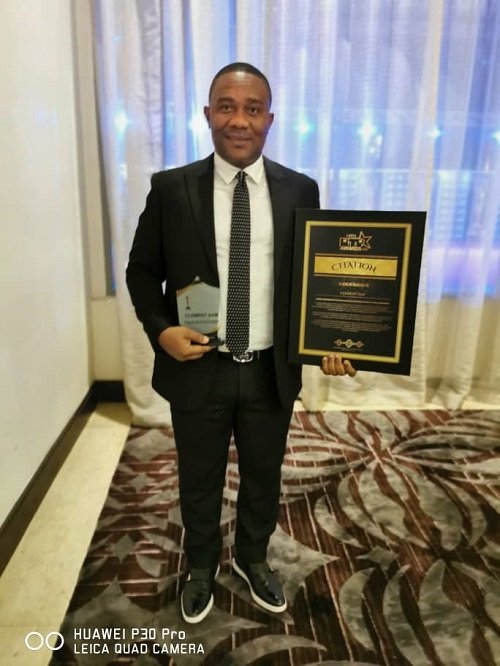Hot!
Clement Sam — abandons Biochemistry dream for Sign Language Interpretation

Born at Korle-Gonno in Accra, Clement Sam, always loved to do things differently and that posture has motivated and propelled him to excel in his endeavours.
The man who hails from Winneba in the Central Region, had wanted to become a Biochemist but that ambition did not manifest as life certainly had other challenging roles in store for him.
His curiosity and the passion to support the less privileged made him take up Sign Language Interpretation — a rather demanding but rewarding venture.
Mr Sam, interacting with The Spectator recently on the intricacies of the role, explained that he decided to become a ‘mediator’ between the deaf community and the public because he wanted to know whether there was a “sign representation to every word we spoke.”

Other than becoming a doctor, an accountant or nurse, he was bent on “doing something different from what was considered a “normal” profession.
“It was easier at the beginning because I was on an adventure and with a heightened curiosity, I wanted to learn more,” he noted.
As expected of a novice in any profession, Mr Sam would make mistakes while interpreting signs and symbols. But he soon realised that there must be no room for mistakes if he, indeed, wanted to excel in his chosen career.
Though it was quite fulfilling for him, he still had to make a conscious effort to improve on any assignment he undertook by listening to feedback or criticism from his peers.
The profession came with its own challenges but Sam believes the favour of God and humility had helped him overcome many hurdles.
“First, I needed to prove all those who doubted me wrong and prove myself right that I have chosen the right career path and will succeed,” he said.
Recounting his first Television encounter on a programme dubbed “This Week” in Ghana Broadcasting Corporation (GBC) studio, Mr Sam said he executed that assignment to the best of his ability as he had already had a similar experience.
“The person interpreting the programme had travelled. I saw an opportunity, went to GBC presented myself as an interpreter and got the job after weeks of trial on set,” he recalled.
That task, he admitted, had since come with other rewarding opportunities within and outside the shores of the country.
Mr Sam had played other crucial roles during the “Meet-The-Press” sessions organised by the Government of Ghana through the Ministry of Information to disseminate and educate the public on COVID-19 and other matters of national interest.
Apart from the long hours he endured while interpreting speeches at this forum, he noted that the engagement also had some setbacks.
“Because I am always seen standing next to officials who handle some of the cases, some people tend to suggest that I might have contracted the disease but all my test results have always proved negative,” he noted.
The full time Sign Language Interpreter has over the years maintained a strong relationship with the Deaf Community through the Ghana National Association of the Deaf (GNAD)
He is a member of the committee set up by GNAD to advocate the recognition of Ghanaian Sign language in the country.
The expert, who aspires to become a Certified International Sign Language Interpreter, emphasised the need to give Ghanaian Sign language utmost recognition.
He urged aspiring interpreters to be humble and “accept constructive criticism from the Deaf community and their colleague interpreters ” and that they should never accept an assignment “for which they do not have the requisite interpretation skills.”
“If they follow these pieces of advice, they will accomplish a lot more than what I have achieved so far,” he stressed.
Mr Sam attended Hampstead Academy Primary and Junior High Schools at Korle-gonno and Winneba Secondary School where he studied General Science before proceeding to University Of Cape Coast.
His parents were the late Mr. Peter Sam of the University of Ghana Medical School and Madam Doris Abore.
In addition to watching and talking football, he enjoys reading research articles on sign language and sign language interpretation. Jollof rice and gizzard are his favourite.
Mr Sam, President of the National Association of Sign Language Interpreters Ghana, was recognised for “Excellence in Sign Language Interpretation” at the recently held Radio and Television Personality (RTP) Awards.
By Edem Mensah-Tsotorme
Hot!
Annoh Dompreh raises alarm over DACF arrears, calls for payment of contractors

The Member of Parliament for Nsawam Adoagyiri, Frank Annoh Dompreh, has expressed concern over delays in the release of the District Assemblies Common Fund, warning that the situation is stalling development across the country.
On his facebook page, he described as a matter of urgent national importance, the Minority Chief Whip pointed to what he sees as a growing crisis of unpaid contractors, abandoned projects, and halted infrastructure works in many districts.
He noted that several communities are grappling with half completed schools, unfinished health facilities, abandoned markets, deteriorating roads, and stalled sanitation projects.
According to him, many contractors who have executed projects for district assemblies have not been paid, forcing some construction firms to demobilise from sites while workers lose their jobs.
He stressed that the District Assemblies Common Fund is not a discretionary allocation but a constitutional requirement under Article 252 of the 1992 Constitution, intended to support development at the local level.
In his view, years of delayed releases and accumulated arrears have weakened district development financing and disrupted projects meant to improve living conditions in communities.
He further argued that some payments made in recent years were largely the settlement of old debts rather than funding for new or ongoing projects, a situation he believes has affected contractor confidence and local economic activity.
He described the issue as more than a budgetary challenge, characterising it as a development emergency and a governance concern.
He therefore urged the appropriate authorities to pay outstanding DACF arrears, settle contractors who have completed their work, and ensure that transfers to districts are automatic and predictable.
He maintained that decentralisation can only succeed when district assemblies receive adequate and timely funding to carry out development projects.
He emphasised that stalled projects directly affect ordinary citizens, since they rely on such infrastructure for education, healthcare, transportation, sanitation, and economic activities.
He called for renewed attention to grassroots development, insisting that national progress should not be concentrated only in major cities but extended to all communities.
By: Jacob Aggrey
Hot!
Breaking: Footballer who killed two children in Abesim handed lifetime sentence

Richard Appiah, the footballer who killed two children and stored part of their bodies in a fridge at Abesim in the Bono Region in 2021 has been handed a lifetime sentence.
This was after a five member panel of judges at the Accra High Court returned a verdict of guilty against the convict.
Appiah, 32, also a draughtsman would spend the rest of his life in prison after he was convicted of murder.
More more more
BY MALIK SULLEMANA






